The HyperTexts
The Shministim: Israeli Refuseniks and Dissenters
The Shministim are young Israeli sarvanim (conscientious
objectors or "refuseniks") who refuse to serve in Israel's military
after graduating from high school. Why? Because the Shministim
(literally, "twelfth graders") claim that the word "Defense" in "Israeli Defense
Forces" is inaccurate. Rather, they see the IDF's brutal military occupation of Gaza
and the West Bank as being highly offensive, in
both senses of the word. For standing firmly for equal rights and justice for
Palestinians, they face repeated jailings for the same "crime" and may be
ostracized by friends and even their own families. Sometimes less
enlightened Israeli Jews physically abuse and spit on them. And yet their
numbers are on the rise: Yesh Gvul reported
more than 500 high school refuseniks in 2003 alone. But not all the refusers are young.
Aging Holocaust survivors
like Hedy Epstein and Reuven Moskovitz also refuse to support Israel's racism,
apartheid and ethnic cleansing. And Jewish intellectuals have long objected to
the dark path Israel has chosen; the two most famous Jewish refusers were Albert
Einstein and Sigmund Freud. Einstein even refused the
presidency of Israel when it was offered to him, writing to his daughter
afterward that he
would have had to tell Israeli Jews things they didn't want to hear. Other famous
Jewish refusers of Zionism include Franz Kafka, Isaac Asimov, Hannah Arendt, Noam Chomsky
and Erich Fromm. Matti Peled, a high-ranking
Israeli general who was called Abu Salaam ("Father of Peace") by Palestinians,
refused to accept Israel's unjust treatment of non-Jews. Now the children
of famous generals and Mossad officials have also joined the ranks of the
refusers: Yael Dayan, Miko Peled, Nurit Peled-Elhanan, Omer Goldman. Non-Jewish
refusers include Nobel Peace Prize laureates Nelson Mandela, Desmond Tutu and
Jimmy Carter.
compiled
by Michael R. Burch, an editor and publisher
of Holocaust and Nakba poetry
Omer Goldman
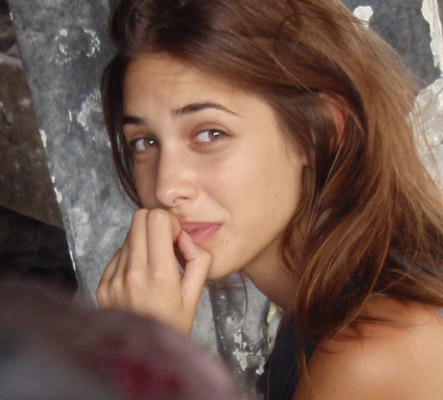
Omer Goldman Granot may have the arresting looks of a supermodel, but
more importantly, she is a super role model for Israeli Jews who believe in true
equality and justice for all human beings, not
excepting Palestinians. She is the daughter of Naftali Granot, a former deputy
head of the Mossad, an Israeli intelligence service similar to the CIA. Omer was sentenced to a military prison for refusing to serve the Israel
Defense Forces (IDF), along with her fellow high-schoolers Tamar Katz and Mia
Tamarin. She has since spent a second term in prison (Israel can re-draft
conscientious objectors and jail them repeatedly for the same "crime"). In her declaration of refusal she stated:
"I refuse to enlist in the Israeli military. I shall not be part of an army that
needlessly implements a violent policy and violates the most basic human rights
on a daily basis. Like most of my peers, I too had not dared to question the
ethics of the Israeli military. But when I visited the Occupied Territories, I
realized a completely different reality, a violent, oppressive, extreme reality
that must be ended. I believe in service to the society I am part of, and that
is precisely why I refuse to take part in the war crimes committed by my
country. Violence will not bring any kind of solution, and I shall not commit
violence, come what may."
Bar Refaeli
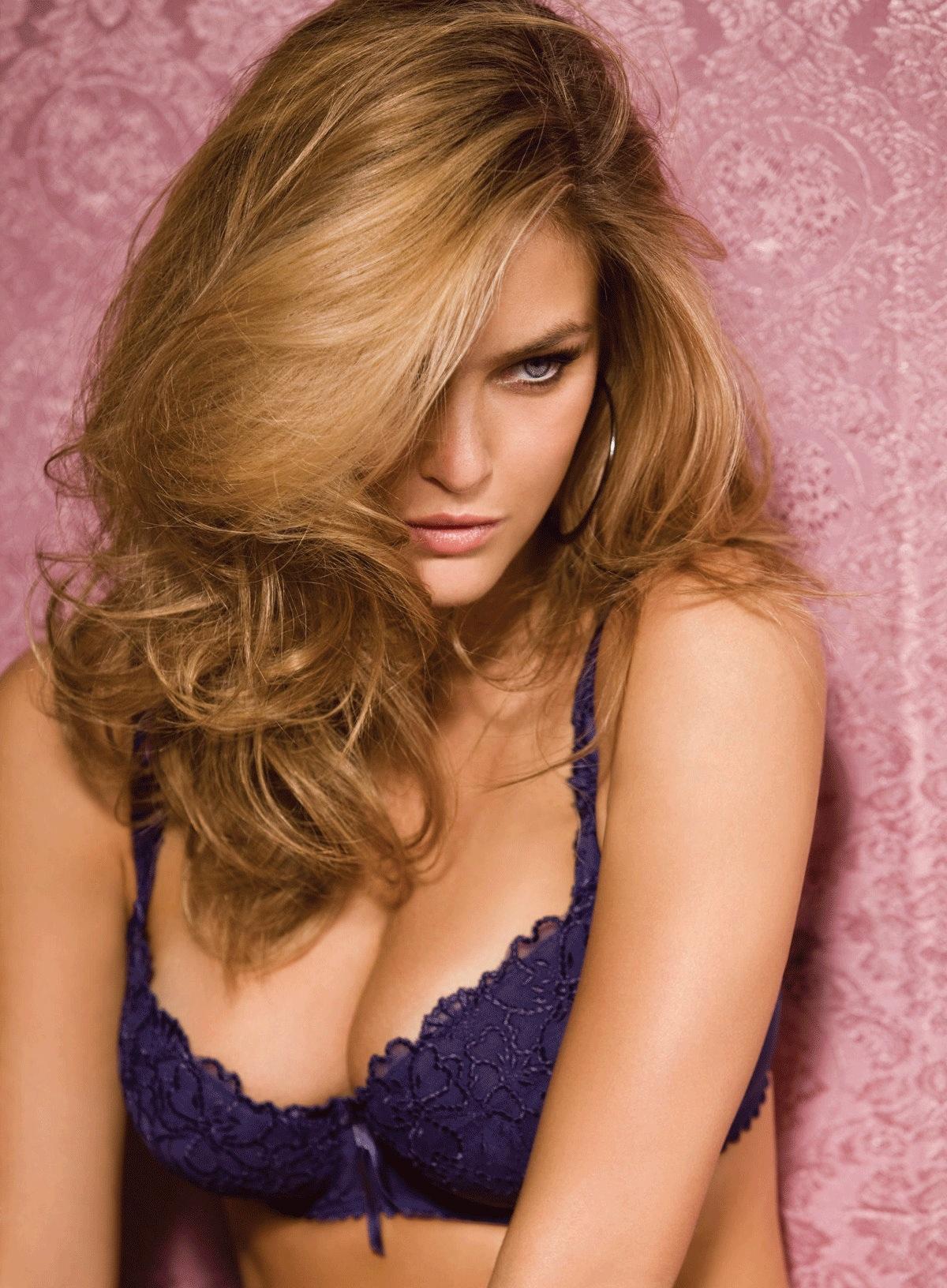
And speaking of supermodels ... Israeli Sports Illustrated Swimsuit Issue cover
model Bar Refaeli married a family friend in 2004, then divorced him soon
afterward in order to avoid military service. Refaeli received widespread
criticism, including from the Israeli Forum for the Promotion of Equal Share, to
which she responded, "I really wanted to serve in the IDF, but I don't regret
not enlisting, because it paid off big time. That's just the way it is,
celebrities have other needs. I hope my case has influenced the army." In a
compromise to avoid potential boycotts of companies Refaeli works with, she
agreed to visit injured IDF soldiers on visits to Israel and, ironically, to
encourage enlistment in the army! The incident made headlines again when another
Israeli model, Esti Ginzburg, criticized Refaeli in an interview with Israeli
newspaper Yedioth Ahronoth, reigniting arguments over the ease with
which conscription can be dodged.
Neria Biala

Neria Biala is a Jewish Israeli peace activist
who looks like a supermodel but is willing to place her body in harm's way, in
the cause of equality and justice for Palestinians.
Maya Wind
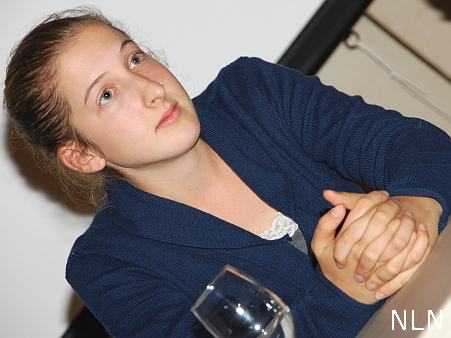
Maya Yechieli Wind, 19, grew up in Jerusalem during the second Intifada, where
she was raised in a secular home but educated in religious schools. Her first
experience with conflict resolution was at age fifteen in Face to Face, a
dialogue group for Israeli and Palestinian youth. Later she became involved in
various co-existence initiatives in the West Bank. She joined the Shministim in
December 2008 and refused to serve in the Israeli army. She spent several weeks
in detention and forty days in military prison, then was exempted in March 2009.
Today she works for Rabbis
for Human Rights and guides political tours in East Jerusalem and the West
Bank for the Israeli
Committee Against House Demolitions. She also co-leads the Jerusalem
dialogue youth group of New
Profile, a feminist peace movement. This is
the statement she read before going to jail: "At first, like many other Israeli
citizens, I too could not bring myself to confront or criticize the Israeli
military’s immoral actions. I realize that this difficulty originated from my
sense of identification with soldiers my own age, to whom I could relate. Today
it is precisely this realization that leads me to refuse to serve. I cannot
recognize the humanity of Israelis but not that of Palestinians. It is because
of my deep sense of commitment and responsibility to the community in which I
grew up that I am refusing to contribute to this cycle of bloodshed. We can no
longer term our military a 'Defense Force.' A defense force does not conquer
lands of another people. A defense force does not assist in the building of
settlements on those lands. A defense force does not permit settlers to throw
stones at Palestinian civilians, nor does it deny them access to their lands and
source of livelihood. None of these are acts of a defense force. The occupation
has no defensive advantages. On the contrary, the pointless occupation of
millions of people only leads to radicalization of opinions, hatred and the
escalation of violence. Violence is a cycle that feeds into itself. This cycle
will not stop until someone stands up and refuses uncompromisingly to take part
in it. This is what I am doing today. My views are also relevant to the current
operation in Gaza. One form of violence cannot stop another. This current
violence is the result of decades of ongoing occupation of the territories and
sieges on Gaza since the disengagement. I mourn the unnecessary deaths of both
Palestinians and Israelis. Yet again we have chosen war."
Matti Peled
Mattityahu "Matti" Peled
was called Abu Salaam, the "Father of Peace," by the Palestinians who
knew him. Peled was an Israeli war hero and Aluf (Major General) who
became a strong advocate for a Palestinian state and a stern critic of Israel's
brutal occupation of the Palestinian territories, which he called "corrupting"
and a violation of the Geneva Conventions. He also called American aid to Israel
a "plague" that was "damaging" to Israel and far in excess of Israel's actual
defense needs.
Albert Einstein
Albert Einstein
was the most famous of all Jewish refusers: he even refused the presidency of Israel! What did
the great Jewish intellectual, peace activist, pacifist and humanitarian have to say about the conflict between Jews and Palestinians? Einstein denied any superior rights for Jews, calling for "complete equality" for Palestinian Arabs as the "most important aspect" of Jewish
policy, saying: "The most important aspect of our policy must be our ever-present, manifest desire to institute complete equality for the Arab
citizens living in our midst ... The attitude we adopt toward the Arab minority will provide the real test of our moral standards as a people."
Only cooperation with Arabs, led by "educated, spiritually alert" Jewish workers, he wrote, "can create a dignified and safe life."
He also said, "What saddens me is less the fact that the Jews are not smart enough to understand this, but rather, that they are not just smart enough to
want
it."
Sigmund Freud
Sigmund Freud,
one of the greatest Jewish thinkers of all time, rejected Zionism, saying: "I
concede with sorrow that the baseless fanaticism of our people is in part to be
blamed for the awakening of Arab distrust."
The Elders
The Elders include Nobel
Peace Prize laureates Jimmy Carter, Nelson Mandela and Desmond Tutu. They too
refuse to accept Israel's unjust treatment of Palestinians.
Tamar Katz
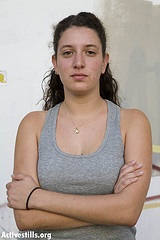
Tamar Katz explains why she is one of the Shministim: "I refuse to enlist in the
Israeli military on conscientious grounds. I am not willing to become part of an
occupying army, that has been an invader of foreign lands for decades, which
perpetuates a racist regime of robbery in these lands, tyrannizes civilians and
makes life difficult for millions under a false pretext of security." She has
been jailed three times for refusing to serve in Israel's army of occupation. In
her declaration of refusal she said: "I oppose the anti-Palestinian policy of
attrition and the oppression, not because I prefer the Palestinian society to
the Israeli one, but out of an understanding that this policy has led us down a
dead-end road politically and to immorality, forced especially on soldiers
stationed in the Occupied Territories. I am not willing to become one of those
holding the gun pointed indiscriminately at Palestinian civilians, and I do not
believe that such actions could bring any change except ever more antagonism and
violence in our region."
Netta Mishly
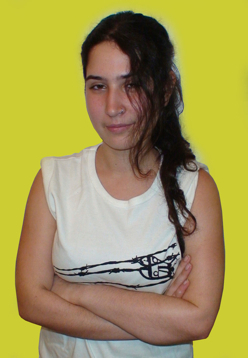
Netta Mishly was born and raised in Tel Aviv. At age fifteen, she started to
take an active part in demonstrations against the wall in the West Bank. The
brutal violence she witnessed there radicalized her. At sixteen, she was an
organizer for an alternative education project that politically empowered youth
and exposed them to radical methods of activism. It was in this project that the
idea of the 2008 Shministim letter was born, with two other future members of
the Shministim 2008, Sahar Vardi and Raz Bar David-Varon. In 2009, Netta was
sent to jail for 20 days after refusing to serve in the Israeli army. Since her
release, she has been involved in immigrant and refugee struggles as well as
anti-occupation actions. This is the statement she read before going to jail: "I
am not willing to be part of an organization committing war crimes, taking the
lives of thousands of innocent civilians, an organization that, in the name of
humanism and democracy, forces me and my peers to sacrifice a period of our
lives, and our lives themselves, for false calm, for no calm shall come to pass
until Israel decides to give up the policy of war and turn towards peace.
Therefore, as a small step towards stopping the cycle of bloodshed, I hereby
refuse to enlist in the military."
Yuval Ophir-Auron
Yuval Ophir-Auron explains why he is one of the
Shministim: "I would like to ask you to recognize that I have a conscientious
problem with enlisting in the army. I believe that the Israeli army has lost its
mission as the organization that defends the country’s citizens within its
borders. For 41 years now, Israel has been imposing an occupation of lands that
are not its own. Lacking any moral justification or values, it rules over these
lands by armed force. It is very clear that this occupation has not been
dictated by fate: it is the outcome of nationalist policies that are aimed to
expand the boundaries of the Jewish state into territories inhabited by another
nation. To maintain control over the Palestinian people and its land, Israel
corrupts its own state machinery: those who are in charge of the legal system
turn crime into legal action; those who have the mandate to judge release their
sure grip on justice, and those with executive power find themselves forced to
soil their hands as they obey orders. A human being among other humans, I,
Yuval, feel committed to some basic values without which we cannot exist. I have
been studying and learning about the occupation these past years, I feel its
pains and as I do so I am becoming familiar with the ills of humankind. What I
see is that with every additional day when Palestinians are kept by force on
their lands, my country manages to crush one more value, one more rule. What I
see is a country guided by the inanity of its leaders, a country in thrall to an
insatiable hunger for another street, another tree to cram into its shattered
borders. I see with what ease our parents close their eyes to the atrocities
that are being committed in our name. I see how we are all turning inwards, just
so we may not have to hear the screams that are reaching us from the other side.
All known human atrocities have been possible only because of blind obedience,
silence, and an indifference to the fate of the other. It is because of all this
that I regard it my moral duty to refuse serving in the army. My conscience does
not allow me to join an organization that demolishes, by fiat of the state, the
homes of innocent people, kills children who are not part of the armed fighting,
and which prevents sick people from getting due treatment. The army interferes
with the freedom of movement, undermines human rights and robs people of their
land because they are not Jews. Implementing government orders, the Israeli army
brings oppression and terror upon three and a half million Palestinians. With
every day that passes, more people sink into this mire – these people are not
bad, they are ordinary people, Jews and Palestinians who don’t resist evil and
do bad things, things that are too bad. They have been told to do these things,
things that are drenched in pain as well as things of whose evil they are
unaware. Today I know what they want me to do and in what they wish me to
participate and I understand that I was not raised to do such things, things
that I will not want to tell my children. Nobody should have to do such things.
I am convinced that it is no one but ourselves who determines that it is our
fate to live by the sword. There is another way, which is not the way of war.
This is the path of dialogue, of understanding, of concession, forgiveness, of
peace. I believe that a person should take responsibility and feel reconciled to
the way he chooses. This is why I shall not join an army behind whose actions I
cannot stand and whose behavior I cannot justify."
Sahar Vardi
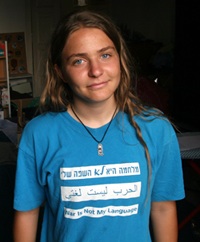
Sahar Vardi is an outspoken peace activist from Jerusalem who bravely started
protesting against Israel’s treatment of the Palestinian people at a very young
age. Activism has long been a part of her family’s life; for instance, Sahar’s
father refused to do his obligatory military service in the first intifada. Then
during the second intifada he became active with Ta’ayush, a
coexistence group of Israelis and Palestinians that mostly works in the occupied
territories. When Sahar was a young girl she would join her father to do
agricultural work with Palestinian villagers, mainly planting trees. Sahar
witnessed first-hand the impact the occupation had on the livelihoods of the
villagers. She recalls that "the shock was not from the brutality of the
occupation or of a specific soldier, but from witnessing the ordinary day to day
situation of going through checkpoints, fearing the demolition of their homes
and knowing that every 18-year old soldier has the power to control their life."
At age 14, Sahar began to go to demonstrations against the Israeli separation
wall, mostly in the village of Bil’in in the West Bank. Against her parent’s
will, Sahar went to the village up to four times a week. Her father pleaded with
her to wait until she was 16 to become an activist. However, Sahar continued to
demonstrate, even as her high school classmates bullied her and called her the
"crazy left wing." Sahar’s outspoken stance against the occupation has also
affected her relationship with her brother, who is in the army. When Israelis
turn 18 it is their legal duty to enlist in the army: boys for three years, and
girls for two years. In high school, Sahar handed out brochures to her
classmates with information on how to become a sarvanim—a conscientious
objector. In August of 2008, Sahar made public her decision to refuse the call
to mandatory military service. Indeed, she insisted on wearing a T-shirt that
said "I refuse to occupy." In a letter to the ministry of defense declaring her
refusal, Sahar wrote: "I realize that the soldier at the checkpoint is not
responsible for the wretched policy of oppression of Palestinian civilians, and
yet I am unable to relieve that soldier of the responsibility for his own
actions … I mean the human responsibility of not causing suffering to another
human being." Sahar served three prison sentences for her refusal to be
conscripted into Israel’s military service. She was released from military
prison in January 2009. In addition to her on-going work as a conscientious
objector to military service, Sahar now also actively protests the eviction
of Arab Israeli families from their homes in order to make way for Jewish
settlements. She is working with the Israeli
Committee Against House Demolitions and the Sheikh
Jarrah Solidarity movement. Families who lose their homes are effectively
forced to become refugees with no compensation or new housing given to
them. More than 20 families are currently under threat of eviction in Sheikh
Jarrah, but protestors like Sahar hope to stop the bulldozers. Such courageous
activism is not without its consequences. In addition to losing friends, Sahar
has been spat on, pushed, sworn at, and occasionally physically assaulted for
her political views. But even in the face of such challenges, Sahar’s resolve
remains steadfast. Young activists such as Sahar Vardi give us hope that in the
midst of hate and war, love and peace is possible. [This bio was largely
extracted from the Nobel Women's Initiative website.]
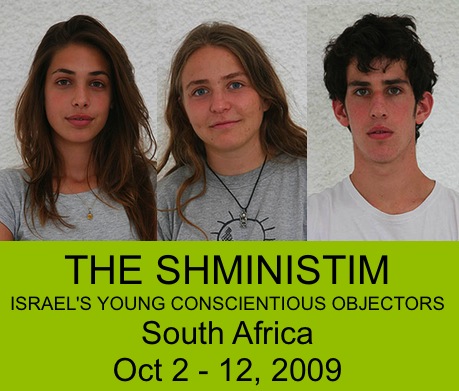
Gideon Levy
Gideon Levy has been called the "most hated man in Israel." Could
this be
because he speaks the truth to power?
Nurit Peled-Elhanan
Nurit Peled-Elhanan is an Israeli peace
activist and the daughter of Matti Peled, an Israeli Aluf
(Major General) who was called Abu Salam (“Father of Peace”) by the Palestinians
who came under his jurisdiction when he was the military governor of the Gaza
Strip. She is the sister of Miko Peled, a peace activist who has written book
called The General's Son: Journey of an Israeli in Palestine, in which
he has supported his father’s and his sister’s views.
Amnon Zichroni
Amnon Zichroni (1935-) is an Israeli lawyer who was the first prominent Israeli
refusenik. The first well-known instance of an individual refusing to serve in
the IDF occurred in 1954 when Zichroni asked to be
released from military service because he was a pacifist. Initially, Israel's
Minister of Defense Pinchas Lavon refused to release Zichroni, although he was
eventually discharged ... but only after he had nearly lost his life during a
three-week long hunger strike.
Yitzchak Ben Mocha
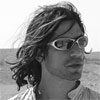
Yitzchak Ben Mocha studies philosophy and zoology at the Tel Aviv University in
Israel. He joined the Israel Defense Forces on December 9, 2002 and left in
November 2005 and has since refused to serve. Ben Mocha did his regular army
service as a combat soldier in the Sayeret Zankhanim, a special combat
unit of paratroopers in the IDF. Within the framework of his army service, Ben
Mocha was involved in IDF's activities all over the West Bank. During that time
he witnessed, disclosed and testified about several incidents of human rights
violations against the Palestinian population. Today Ben Mocha refuses to serve
in the IDF for reasons of conscience; he has refused repeatedly to take part in
military activities, most recently in the IDF's December 2008 and January 2009
actions against Gaza.
Yesh Gvul
Yesh Gvul ("there is a limit" or "the border exists") is a movement
founded in 1982 at the outbreak of the Lebanon War by Israeli reservists who
refused to serve in Israel's invasion of Lebanon. A petition, delivered to Prime
Minister Menachem Begin and Defense Minister Ariel Sharon was signed by 3,000
reservists, some of whom were court-martialed and served time in military prison
for refusing to obey orders. The organization currently it sees its main role as
"backing soldiers who refuse duties of a repressive or aggressive nature." It
also engages in human rights activities, such as petitioning British courts to
issue arrest warrants for IDF officers accused of human rights abuses and war
crimes.
Adam Keller
The Adam Keller Court Martial drew considerable public attention in April and
May of 1988. Reserve Corporal Adam Keller was charged with
"insubordination" and "spreading of propaganda harmful to military discipline"
because while on active military duty he had written graffiti on 117 tanks and
other military vehicles: "Soldiers of the IDF, refuse to be occupiers and
oppressors, refuse to serve in the occupied territories!" He also wrote "Down
with the occupation!" on electricity pylons in the military camp where he was
serving, and on the doors of officers' toilet stalls. Keller was convicted and
sentenced to three months imprisonment: perhaps a relatively mild sentence, as
the maximum penalty could have been six years. Keller was an active member of
Yesh Gvul, but declared that he had done his act on his own without
consulting anybody else. Yesh Gvul did not take responsibility for his
act, but did provide his wife with the monetary support given to the families of
refusers.
More Refusers
Reuven Moskovitz
is a Jewish Holocaust survivor
who received the 2001 Mount Zion Award and the 2003 Aachen Peace Prize.
Vanessa Redgrave: A Passion for Justice is a testimonial to a courageous
actress who sold two houses in order to finance a documentary about the plight
of the Palestinians.
Avraham Burg: the
Prophet-Poet of Judaism tells the tale of a former
(interim) President of Israel, Speaker of the Knesset, and chairman of the
Jewish Agency and World Zionist Organization who has provocative ideas about the
future shape of Israel, Judaism and Zionism. Why is one of Israel's leading
politicians asking Israel to stop using the Shoah to excuse the Nakba?
The Lunatic State and a Voice of Reason
explores the thoughts of Professor Norman Finkelstein, the son of two
Holocaust survivors who grew up to become one of Israel's fiercest critics.
Who the hell was Furkan
Dogan, and why should we care? Should we care about an 18-year-old peace
activist who was summarily executed by the government of Israel in international
waters for the "crime" of being aboard a ship that was trying to deliver
humanitarian aid to the suffering people of Gaza?
"Long Live Palestine" by LowKey
What does a young English-Iraqi rapper who longs for justice have to say
about the governments of Israel and the US denying human rights and freedom to completely innocent
Palestinian women and children?
Dahlia Ravikovitch,
who died in 2005 at the age of 69, was one of Israel’s most beloved writers. She
was also acclaimed for her courage as a peace activist who was "deeply involved
in the cause of Palestinian human rights."
As Mike Burch worked on the poetry page of Dahlia Ravikovitch, he experienced
An Especially Eerie Convergence that sheds light on the connection between
9-11, two terrible wars, and the fate of Palestinian women and children.
Isaac Asimov: “I am frequently asked if I have visited Israel, whereas yet, it
is simply assumed that I have. Well, I don’t travel. I really don’t, and if I
did, I probably wouldn’t visit Israel. I remember how it was in 1948 when Israel
was being established and all my Jewish friends were ecstatic, I was not. I
said: what are we doing? We are establishing ourselves in a ghetto, in a small
corner of a vast Muslim sea. The Muslims will never forget nor forgive, and
Israel, as long as it exists, will be embattled. I was laughed at, but I was
right. I can’t help but feel that the Jews didn’t really have the right to
appropriate a territory only because 2000 years ago, people they consider their
ancestors, were living there. History moves on and you can’t really turn it
back.”
Christopher Hitchens: “Actually—and this was where I began to feel seriously
uncomfortable—some such divine claim underlay not just 'the occupation' but the
whole idea of a separate state for Jews in Palestine. Take away the divine
warrant for the Holy Land and where were you, and what were you? Just another
land-thief like the Turks or the British, except that in this case you wanted
the land without the people. And the original Zionist slogan—'a land without a
people for a people without a land'—disclosed its own negation when I saw the
densely populated Arab towns dwelling sullenly under Jewish tutelage. You want
irony? How about Jews becoming colonizers at just the moment when other
Europeans had given up on the idea?”
Christopher Hitchens: “One of my first reservations about Zionism was and is
that, semiconsciously at least, it grants the anti-Semite's first premise about
the abnormality of the Jew.”
Victor Klemperer: “To me the Zionists, who want to go back to the Jewish state
of A.D. 70 (destruction of Jerusalem by Titus) are just as offensive as the
Nazis. With their nosing after blood, their ancient 'cultural roots,' their
partly canting, partly obtuse winding back of the world they are altogether a
match for the National Socialists. That is the fantastic thing about the
National Socialists, that they simultaneously share in a community of ideas with
Soviet Russia and with Zion.”
Shministim
and other refusers who have "gone public" with their passionate (and often
eloquent) dissent include: Omer Goldman, Yuval Ophir-Auron, Sahar Vardi, Tamar Katz, Mia
Tamarin, Netta Mishly, Maya Wind, Moriel Rothman, Noam Gur, Alon Gurman, Or
Ben-David Katz, Raz Bar-David Varon, Effie Brenner, Yitzchak Ben Mocha, Adam
Keller and Amnon Zichroni.
The HyperTexts








